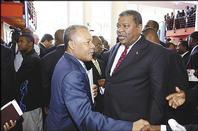Sasha Mohammed, Contributor

A STIRRING plea for people of the Caribbean region to have confidence and faith in the newly-established Caribbean Court of Justice (CCJ) was the common call of keynote speakers at the historic opening ceremony at Queens Hall, St. Ann's Saturday.
Addressing the gala inauguration of the long-awaited regional court were Trinidadian Prime Minister Patrick Manning, his St. Lucian counterpart Dr. Kenny Anthony, CCJ President Michael De La Bastide and Caribbean Community (CARICOM) Secretary-General, Dr. Edwin Carrington.
All sought at length to reassure the public that the court was indeed the best legal system for CARICOM, in the wake of a barrage of criticisms and legal wrangling recently hurled against its establishment by various detractors from different member-states.
Hailed as one of the region's main steps toward integration, the CCJ's headquarters is based in Trinidad and Tobago. Its establishment began as a need for a Caribbean Court of Appeal to replace the Judicial Committee of the Privy Council in London as the final court of appeal for countries in the region.
COURT HAS MORE JURISDICTION
To date, all 14 member-states of CARICOM have signed the agreement establishing the CCJ, but as it stands, the court immediately has more jurisdiction over trade matters in the CARICOM Single Market and Economy than it does over judicial appeals in these countries.
Several countries are yet to get over constitutional and legal hurdles to pass the necessary legislation to enable them to use the CCJ as the final appeal court, so far, only Guyana and Barbados have done so.
The main concern expressed by critics of the CCJ is whether its six judges and president will be able to maintain their independence in rulings from the political directorate of the CARICOM countries. Other concerns included CARICOM's capacity to support the court financially.
It was in deference to these perceived faults that Anthony, in his address on Saturday, called on the people to have confidence in the court.
"My message to the people of the Caribbean Community is summarised in one word: confidence. Confidence in the rightness of the step we are now taking to establish the CCJ, and confidence in our ability to continue the journey which that first step implies" he said.
Anthony also stressed that the Caribbean's legal minds have historically been renowned throughout the world as some of the best practitioners of the trade.
"The Caribbean is not a fledgling state approaching tentatively the threshold of the rule of law. We laid the foundations of strong legal professions and legal and judicial institutions many decades ago, and both at home and abroad, our lawyers have risen to the highest levels of legal and judicial service.
"To question our capacity to complete what is after all the overdue reform of our regional judicial system is to do a disservice to ourselves," Anthony said.
Dr. Carrington hailed the CCJ as the region's final step toward independence from colonialism, stressing in his welcome remarks that "This court is the court of the Caribbean people, by the Caribbean people, for the Carib-bean people ... Citizens in the region are to be congratulated for taking this step".
COLONIAL MASTERS
In endorsing Carrington, Manning noted that "It was the late, eminent regional jurist, Sir Telesford Georges, who ob-served that to have independent countries referring legal jurisdiction to their former colonial masters is tantamount to a grown man who demonstrates his independence but continues to live in his parent's house.
"It is with great pleasure that I inform you that we have now found excellent accommodation, and we are moving out," he said to laughter and applause.
"By its very constitution, this court is testimony to the ability of the peoples of this region to stand with the best in the world. We have continuously done so in every field of endeavour. The CCJ is our statement that in yet another area, we are once again prepared to stand as one region with one voice," said Manning.
In his address, De La Bastide, made it clear that the question of political interference in the CCJ was not a possibility by the very design of the agreement.
Its judges are appointed and removed by an independent commission, "none of whose members is a politician, a nominee of a politician or chosen by the political process," he said.
De La Bastide also hailed the CCJ as "unique" because it serves two important purposes as one institution.
He also said the court "has the capacity to make an important contribution to the integration movement in the region".
Saturday's inauguration was attended by hundreds of prominent members of the legal, diplomatic, political and business sectors throughout the region, including the heads of state from 10 CARICOM member-countries and senior members of governments from the remaining four. Noticeably absent were members of the Opposition United National Congress, who had, in Friday's sitting of Parliament, launched a stinging attack on the planned gala ceremony, saying it was a waste of money.
MULTICULTURAL ACTIVITIES
The three-hour-long ceremony, which began at around 9:30 a.m., featured a host of multicultural activities, including tassa and African drumming and per-formances by the Lydian Singers, chutney artiste Rikki Jai and pannist Len Boogsie Sharpe.
Though the court caters for nine judges and the president, only six have been appointed so far. They are former Trinidad and Tobago (T&T) Chief Justice De La Bastide, Justices Rolston Nelson, Duke Pollard (Guyana), (all previously sworn in) Adrian Saunders (St. Vincent and the Grenadines), Desiree Bernard (Guyana) (who took their oaths before President George Maxwell Richards at Saturday's inaugura-tion) and Professor David Hayton (England) and Jacob Wit (Dutch Antilles) who are to take their oaths by July.
To date, all 14 member-states of CARICOM have signed the agreement establishing the CCJ, but as it stands, the court immediately has more jurisdiction over trade matters in the CARICOM Single Market and Economy than it does over judicial appeals in these countries.








